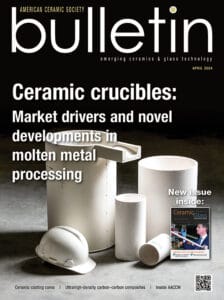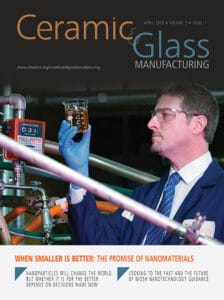Porous materials are utilized in many applications including but not limited to thermal insulation, catalysts, catalyst supports, filters, adsorbers and sensors. This symposium aims to bring together the technical community to share recent advances in the formation, characterization, properties and modeling of porous ceramic, carbon, glass and glass-ceramic components for any application. These materials contain pore sizes from the nanometers to millimeters, and can have textured to random porosity or hierarchical porosity and be based on various pore architectures, such as foams, honeycombs, fiber networks, bio-inspired structures.
This symposium will be the ideal showcase for the research activities of many groups involved in the development and use of porous materials including but not limited to the areas of ceramics, chemistry, mechanics, fluid dynamics, modeling and simulation, and application engineering.
Proposed Session Topics
- Innovations in processing methods and synthesis of porous ceramics
- Structure and properties of porous ceramics
- Novel characterization tools of porous structures
- Mechanical behavior of porous ceramics
- Microporous and mesoporous ceramics
- Ceramic membranes
- Ceramics with hierarchical porosity
- Engineered porous architectures enabled by additive manufacturing technologies
- Porous ceramics for environmental applications
- Porous ceramics for energy applications
- Porous ceramics for biological applications
- Porous ceramics for functional applications
- Porous ceramics for water filtration
Symposium Organizers
- Paolo Colombo, University of Padova, Italy
- Manabu Fukushima, National Institute of Advanced Industrial Science and Technology (AIST), Japan
- Tobias Fey, University of Erlangen-Nuremberg, Germany
- Farid Akhtar, Lulea University of Technology, Sweden
- Samuel Bernard, Institut de Recherche sur les Céramiques de Limoges, France
- Giorgia Franchin, University of Padova, Italy
- Jacob George, Corning, USA
- Aleksander Gurlo, Technical University Berlin, Germany
- Miki Inada, Kyushu University, Japan
- Jian-feng Yang, Xi’an Jiaotong University, China
Points of Contact
- Paolo Colombo: paolo.colombo@unipd.it
- Manabu Fukushima: manabu-fukushima@aist.go.jp
- Tobias Fey: tobias.fey@fau.de
Subscribe to Ceramic Tech Today

Don’t miss the latest ceramic and glass materials news. Receive the CTT newsletter to your email three times a week by subscribing at this link.
Subscribe to Ceramic & Glass Manufacturing Weekly

Don’t miss the latest ceramic and glass business news. Receive the C&GM Weekly newsletter to your email every Monday by subscribing at this link.


